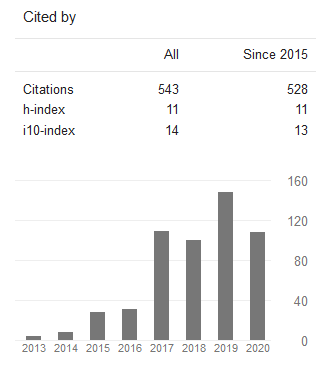Analisis Sentimen Review Hotel Menggunakan Metode Deep Learning BERT
DOI:
https://doi.org/10.24002/jbi.v14i02.7244Keywords:
sentiment analysis, SmallBERT, deep learning, natural language processing, fine-tuningAbstract
Pandemi COVID-19 telah menyebabkan penurunan kunjungan pariwisata dan okupansi hotel. Penting bagi pengusaha hotel untuk memantau gaya hidup pengunjung guna menjaga kelangsungan bisnis. Salah satu cara untuk melakukannya adalah dengan memahami sentimen pengunjung hotel melalui analisis review agar mendapatkan pemahaman yang lebih baik dalam pengambilan keputusan terkait layanan dan aspek bisnis di sektor perhotelan. Penelitian ini menerapkan model deep learning natural language processing BERT untuk menganalisis sentimen positif dan negatif dari review pengunjung hotel di Indonesia. Model BERT yang digunakan telah menjalani proses pretrained dan diterapkan metode fine-tuning untuk menghasilkan analisis sentimen yang akurat. Hasil evaluasi menunjukkan bahwa model fine-tuning SmallBERT yang dilatih menggunakan dataset 515k review hotel selama 5 epoch memberikan performa yang baik. Model SmallBERT mencapai akurasi sebesar 91,40%, presisi 90,51%, recall 90,51%, dan skor f1 90,51% saat dievaluasi dengan dataset yang diberi label secara manual. Visualisasi hasil perbandingan sentimen yang didominasi oleh sentimen positif, dilakukan menggunakan Tableau
References
S. Wibowo, O. Rusmana, S. Muslim, and S. Tinggi Pariwisata Bandung, “Pengembangan Ekonomi Melalui Sektor Pariwisata Tourism,” Jurnal Kepariwisataan: Destinasi, Hospitalitas dan Perjalanan, vol. 1, no. 2, pp. 93–99, Dec. 2017, doi: 10.34013/JK.V1I2.13.
Badan Pusat Statistik, “Tingkat Penghunian Kamar (TPK) Hotel,” Sistem Informasi Rujukan Statistik. https://sirusa.bps.go.id/sirusa/index.php/indikator/60 (accessed Apr. 18, 2022).
Kemenparekraf/Baparekraf, “Statistik Kunjungan Wisatawan Mancanegara Bulan Januari 2022,” Mar. 11, 2022. https://kemenparekraf.go.id/statistik-wisatawan-mancanegara/statistik-kunjungan-wisatawan-mancanegara-bulan-januari-2022 (accessed Apr. 08, 2022).
J. J. Kim and H. Han, “Saving the hotel industry: Strategic response to the COVID-19 pandemic, hotel selection analysis, and customer retention,” Int J Hosp Manag, vol. 102, p. 103163, Apr. 2022, doi: 10.1016/J.IJHM.2022.103163.
S. Alvianna, “Analisis Pengaruh Harga, Produk, Dan Kualitas Layanan Terhadap Kepuasan Wisatawan Di Taman Wisata Air Wendit Kabupaten Malang” Jurnal Pariwisata Pesona, vol. 2, no. 1, Jun. 2017, doi: 10.26905/JPP.V2I1.1263.
J. Thanaki, Python natural language processing : explore NLP with machine learning and deep learning techniques. Birmingham: Packt Publishing Ltd., 2017.
P. Chinnasamy, V. Suresh, K. Ramprathap, B. J. A. Jebamani, K. Srinivas Rao, and M. Shiva Kranthi, “COVID-19 vaccine sentiment analysis using public opinions on Twitter,” Mater Today Proc, Apr. 2022, doi: 10.1016/J.MATPR.2022.04.809.
M. Singh, A. K. Jakhar, and S. Pandey, “Sentiment analysis on the impact of coronavirus in social life using the BERT model,” Soc Netw Anal Min, vol. 11, no. 1, pp. 1–11, Dec. 2021, doi: 10.1007/s13278-021-00737-z.
A. Vaswani et al., “Attention Is All You Need,” Adv Neural Inf Process Syst, vol. 2017-December, pp. 5999–6009, Jun. 2017, Accessed: Apr. 24, 2023. [Online]. Available: https://arxiv.org/abs/1706.03762v5
S. Ravichandiran, Getting started with Google BERT : build and train state-of-the-art natural language processing models using BERT. Birmingham: Packt Publishing Ltd., 2021.
J. Devlin, M. W. Chang, K. Lee, and K. Toutanova, “BERT: Pre-training of Deep Bidirectional Transformers for Language Understanding,” NAACL HLT 2019 - 2019 Conference of the North American Chapter of the Association for Computational Linguistics: Human Language Technologies - Proceedings of the Conference, vol. 1, pp. 4171–4186, Oct. 2018, doi: 10.48550/arxiv.1810.04805.
Y. Zhang, K. Chen, Y. Weng, Z. Chen, J. Zhang, and R. Hubbard, “An intelligent early warning system of analyzing Twitter data using machine learning on COVID-19 surveillance in the US,” Expert Syst Appl, vol. 198, p. 116882, Jul. 2022, doi: 10.1016/J.ESWA.2022.116882.
S. Tabinda Kokab, S. Asghar, and S. Naz, “Transformer-based deep learning models for the sentiment analysis of social media data,” Array, vol. 14, p. 100157, Jul. 2022, doi: 10.1016/J.ARRAY.2022.100157.
S. Y. Lin, Y. C. Kung, and F. Y. Leu, “Predictive intelligence in harmful news identification by BERT-based ensemble learning model with text sentiment analysis,” Inf Process Manag, vol. 59, no. 2, pp. 1–18, Mar. 2022, doi: 10.1016/J.IPM.2022.102872.
K. S. Nugroho, A. Y. Sukmadewa, H. W. DW, F. A. Bachtiar, and N. Yudistira, “BERT Fine-Tuning for Sentiment Analysis on Indonesian Mobile Apps Reviews,” ACM International Conference Proceeding Series, pp. 258–264, Jul. 2021, doi: 10.1145/3479645.3479679.
B. Selvakumar and B. Lakshmanan, “Sentimental analysis on user’s reviews using BERT,” Mater Today Proc, Apr. 2022, doi: 10.1016/J.MATPR.2022.03.678.
B. Ray, A. Garain, and R. Sarkar, “An ensemble-based hotel recommender system using sentiment analysis and aspect categorization of hotel reviews,” Appl Soft Comput, vol. 98, p. 106935, Jan. 2021, doi: 10.1016/J.ASOC.2020.106935.
I. Turc, M.-W. Chang, K. Lee, and K. Toutanova, “Well-Read Students Learn Better: On the Importance of Pre-training Compact Models,” Google Research, pp. 1–13, Aug. 2019, Accessed: Apr. 05, 2023. [Online]. Available: https://arxiv.org/abs/1908.08962v2
C. Raffel et al., “Exploring the Limits of Transfer Learning with a Unified Text-to-Text Transformer,” Journal of Machine Learning Research, vol. 21, pp. 1–67, Oct. 2019, Accessed: Apr. 10, 2023. [Online]. Available: https://arxiv.org/abs/1910.10683v3
Q. Chen, Z. Zhuo, and W. Wang, “BERT for Joint Intent Classification and Slot Filling,” Feb. 2019, Accessed: Apr. 10, 2023. [Online]. Available: https://arxiv.org/abs/1902.10909v1
X. Zhao and Y. Sun, “Amazon Fine Food Reviews with BERT Model,” Procedia Comput Sci, vol. 208, pp. 401–406, Jan. 2022, doi: 10.1016/J.PROCS.2022.10.056.
J. Liu, “515K Hotel Reviews Data in Europe | Kaggle,” 2017. https://www.kaggle.com/datasets/jiashenliu/515k-hotel-reviews-data-in-europe (accessed Apr. 21, 2023).
Downloads
Published
Issue
Section
License

This work is licensed under a Creative Commons Attribution-ShareAlike 4.0 International License.
Copyright of this journal is assigned to Jurnal Buana Informatika as the journal publisher by the knowledge of author, whilst the moral right of the publication belongs to author. Every printed and electronic publications are open access for educational purposes, research, and library. The editorial board is not responsible for copyright violation to the other than them aims mentioned before. The reproduction of any part of this journal (printed or online) will be allowed only with a written permission from Jurnal Buana Informatika.
This work is licensed under a Creative Commons Attribution-ShareAlike 4.0 International License.










